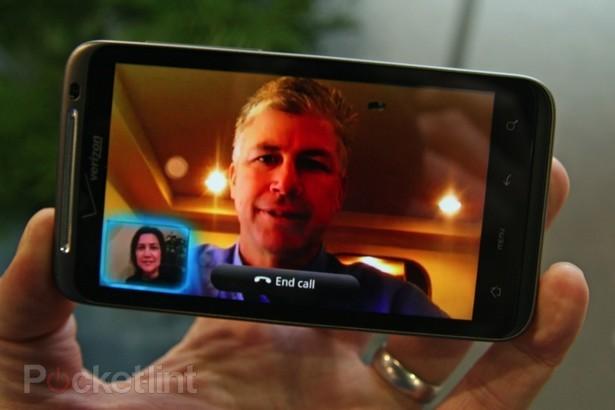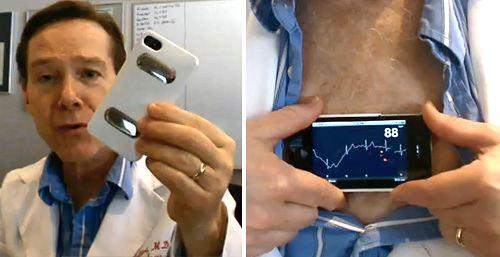
By a show of hands, who else hates making routine trips to the doctor's office?
I have a feeling that few of you didn't raise your hand, or at least think about it before realizing how ridiculous you would look while raising your hand in front of your computer monitor.
Thanks to our most beloved pocket-sized computers, inconvenient or unnecessary trips to the doctor, among other things, could soon become a thing of the past. Yesterday, Josh Constine of TechCruch gave us a rough transcript of what was outlined by Daniel Kraft, Singularity University‘s executive director of FutureMed, founder of StemCore systems and creator of MarrowMiner (a minimally invasive bone marrow stem cell extraction tool), at the Practice Fusion conference. Kraft covered "six HealthTech ideas" that could change the way medical practitioners do medicine in 2012. Unsurprisingly, most (not all) of them have a strong tie to two currently exploding markets, smartphones and social media.
Of the six items covered, only four are of interest to us cell phone mongers: artificial intelligence, Social Health Network, more convenient communication with doctors and the use of the smartphone as a medical tool.
For artificial intelligence, Constine notes, "Siri and IBM's Watson are starting to be applied to medical questions." Unlike Siri, however, AI can be applied in different ways than simply voice control. It is possible that one day you could have the ability to take a picture of a rash, mole or some other dermis anomaly and a cloud-based AI service could diagnose the spot in question. In fact, there is already a slightly dumber version of this, called Skin Scan, which doesn't diagnose the problem area but will at least give the user an idea whether it's malignant or benign.
Social networking can both be used to improve health by peer pressure – online sharing of one's progress (or lack thereof) on a diet could pressure users into sticking to their diet a little better. The idea is similar to Weight Watchers, just taking the shared experience online. Online networks can be used to track health data, like the path of influenza, says Constine.
But the part we're all interested in is staying far away from the doctor's office, right? Well, for some of us at least.
The idea of scheduling a video call with your doctor instead of hopping in the car and making the trek to the doctor's office is novel, yet not terribly far-fetched. The technology is already there. As Constine explains, however, the only problems are the "regulatory and reimbursement markets around them." Physicians certainly are not going to go pro bono and allow everyone to call in instead of visiting in person. Doctors will still have to be compensated for their work. And the privacy of your health information? You might want some regulation of HIPAA before you start discussing your medical information via video chat.

And the use of smartphones as medical tools is quickly becoming a reality, too. Constine describes:
"Though some aren’t cleared for sale in US yet, devices like the Alivecor electrocardiogram can monitor your heart in realtime, send the data to the cloud, and allow your cardiologist to look at it instantly. Other devices are turning phones into otoscopes for looking in your ears, or glucometers for monitoring blood sugar."
The good news is that none of this would be very difficult to put into place. All of the technology for these radical changes already exists or is just around the corner. The bad news it that few doctors are going to be on board with a lot of advancements like this. One, they will still need to be fairly compensated for their work. Two, nobody likes the feeling of being replaced by a machine. However unlikely it may seem, they largely would be in some instances – like an artificially intelligent diagnosis of a malignant melanoma cancer cell through a picture taken with a smartphone, which could circumvent much of a dermatologist's responsibilities.
I, for one, am all for less visits to the doctor's office. I would have no problem video calling my doctor to further assess whether I should come in for treatment or not. However, I don't think I would fully trust the diagnosis given by an artificially intelligent cloud service just yet. But it might encourage me to take a trip to my dermatologist – when I otherwise wouldn't – if a diagnosis comes back malignant.
It's really intriguing stuff, and I'm really excited to see some changes such as these stake their claim in the medical industry. It could take some time, though, due to a strict regulatory system which is "pushing innovation offshore."
What say you, ladies and gents? Would you prefer to video call your physician instead of making a trip to their office? Are you all for anything that keeps you out of the doctor's office as much as possible? Could you trust an artificially intelligent cloud-based service that diagnoses skin lesions?
Image via Pocket-lint, TechCrunch